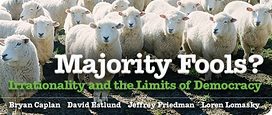Thanks to Bryan for engaging my comments so energetically. In his post “The Circularity of General Acceptability, ” Bryan wonders whether the general acceptability approach to political justification that I sketch in a previous post might be a circular justification for democracy and against rule of experts.
A circular argument would be one that assumes the truth of its conclusion amongst its premises. The general acceptability approach assumes nothing either way about whether political authority must be democratic. There are two parts to the answer. First, you might think it presupposes democracy because general acceptability is itself a democratic test. The name alone might easily suggest this, but the actual criterion dispels the suggestion. To see this we need to stipulate that democracy, whatever else it involves, must involve the actual collective authorization of the laws by the people subject to them. The general acceptability condition isn’t a test of actual acceptance, but acceptability, which is hypothetical. So for example, we ask whether the alleged moral/political wisdom of economists is acceptable to the wide range of reasonable points of view, counting many mistaken views as nevertheless reasonable. Not whether it is or has been actually accepted. So it is not a democratic principle.
It might still seem akin to democracy in seeking a kind of “popularity,” to use another way Caplan puts his worry. But the question of acceptability to all reasonable points of view has nothing to do with how many people it is acceptable to. I agree with him that the mere fact that more people do or could approve of an arrangement is so far not saying much to justify it. By contrast, saying that no reasonable objection to it is possible is saying something more signficant.
Quickly, a second way to see that the general acceptability approach does not beg the question in favor of democracy is to see that on this view if the superior moral/political wisdom of the economists were generally acceptable in this sense, then that would, I believe justify their rule (within limits of course, just as there are limits on democratic authority).
Bryan raises another point in that post about how badly the majority has to go wrong before I would desist. I hope to come back to that. Here I am just responding to the charge of circularity. And recall why it matters to Bryan’s original argument. He claims that economists and college graduates ought to have more votes because they know best. I say knowing best doesn’t establish a right to rule unless the claims to expertise are generally acceptable in a certain way. I argue they are not, but if they had been then democracy would have lost. So we have not begged the question in favor of democracy.

